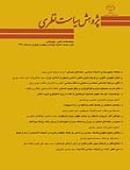رگههای استعمار در فلسفه کانت (با تکیه بر آراء اسپیوک)
محورهای موضوعی : پژوهش سیاست نظریصدیقه پورمختار 1 , شمس الملوک مصطفوی 2 , سید محمد مرندی 3
1 - دانشگاه آزاد اسلامی واحد علوم تحقیقات تهران
2 - دانشگاه آزاد واحد تهران شمال
3 - دانشگاه تهران
کلید واژه: اسپیوک کانت استعمار والایی غایتشناسی,
چکیده مقاله :
یکی از عوامل موفقیت استعمار در سرزمین های مستعمره خود، علاوه بر گزینه نظامی، استفاده هوشمندانه از فنون بلاغت و سخنوری بوده و از این رو مأموریت متمدن سازی اروپایی بر اساس فرهنگ به عنوان سخنوری پایه گذاری و از طریق ادبیات و فلسفه قرن هجدهم و نوزدهم دنبال شده است. «امانوئل کانت»، فیلسوف بزرگ قرن هجدهم آلمان، در کتاب «نقد قوه حکم» خود که بخش اول آن فلسفه ذوق (مبحث زیبا و والا) و بخش دوم آن به غایتشناسی اختصاص دارد، سوژه ای را معرفی می کند که تحت شرایط خاصی به درک زیبایی، والایی و غایتمندی نائل می شود؛ اما از آنجایی که از نظر کانت چنین درکی متعلق به همگان نیست، این پرسش فراروی منتقدان قرار می گیرد که آیا می توان گفت سوژه کانتی در نقد سوم، نشانی از نژادگرایی و استعمار در خود دارد؟ مقاله حاضر بر اساس آرای «گایاتری چاکراورتی اسپیوک»، منتقد و اندیشمند مشهور حوزه مطالعات پسااستعماری، به بررسی و پاسخ این پرسش میپردازد. اسپیوک بر این اعتقاد است که نظرهای کانت در دو مورد دارای نژادگرایی و استعمار است؛ یکی در تحلیل والایی که می گوید انسان خام به دلیل آنکه آموزش دیده و بافرهنگ نیست، والایی را تنها به عنوان مفهومی دهشتناک درک می کند و دوم در بحث غایت شناسی که بومیان استرالیایی را فاقد فاعلیت انسانی می داند. بنابراین سوژۀ شناسای جهان شمول یا انسان کانتی به تمامی بشریت رجوع نمیکند، بلکه تنها به سوژه آموزش دیدۀ بورژوایِ مردِ دوران روشنگری اروپا که بخشی از اصول عقلانی گسترش امپریالیسم را فراهم کرده است، توجه نشان می دهد.
The success of British colonial rule during the nineteenth century was not only dependent on the threat of military force, but also on the sophisticated use of rhetoric so the civilizing mission of Europeans established based on culture as rhetoric and followd 18th and 19th century literature and philosophy. This superiority was followed by 18th and 19th century`s philosophy and literature. Emanuel Kant, the great philosopher of 18th century, in his book “Critique of Judgment” that its first part is the Critique of Aesthetic Judgment and its second part deals with the Critique of Teleological Judgment. Kant in this book introduced a subject, that achieves beauty and sublimity and finality under special conditions; however since in Kant’s view, such understanding is not specific to all people, this question arises for critics that whether there is a sign of racism and colonianism in third criticism of Kant Subject. So, the main question of this article is that is there any colonial and racism streaks in third critique of Kant. This article based on the ideas of the post-colonial critic and theorist, Gayatri Chakravorty Spivak, is a well-known scholar in diverse fields of post-colonial research, examines and answers this question. Spivak believes that Kant’s theories in two cases, use racism and colonialism; first in analysis of sublimity he states that raw man can understand sublimity as a terrible conceptions because he is not educated and cultured; secondly, in finality discussion, considers Australian indigenous inhabitants without humane nominality. Therfore, the indicating subject of universality or Kant Human does not refer to all humans, but only pays attention to burgeous educated man subject of European Enlightenment period as providing a part of rational principles of Imperialism development.
کانت، ایمانوئل (1377) نقد قوه¬ حکم، ترجمه عبدالکریم رشیدیان، تهران، نی.
Amrams M.H. (2009) A Glossary of Literary Terms. New York: Wadsworth Cengage Learning.
Bart- Moore, Gilbert. (1997) Postcolonial Theory Contexts, Practices, Politics London • New York: Verso.
Bernasconi, Robert (2002) ‘Kant as an Unfamiliar Source of Racism’. In Philosophers on Race. Oxford: Blackwell Publishing.
Caygill, H. (1989) Art of Judgement. Oxford, UK: B. Blackwell.
Chuckwudi Eze, Emmanuel. (1997) ‘The Color of Reason: The Idea of «Race» in Kant’s Anthropology’, Postcolonial African Philosophy. Oxford: Blackwell, pp: 103–140.
Flikschuh, Katrin and Ypi, Lea (2014) Kant and Colonialism: Historical and Critical Perspectives, Oxford: Oxford University Press.
Fischer-Tiné, Harald (2011) Postcolonial Studies. European History Online.
Gahandi, Leela (1998) Postcolonial theory: A Critical Introduction. Columbia University press.
Gayatri Chakravorty Spivak (1999) A Critique of Postcolonial Reason: Towards History of the Vanishing Present, Cambridge: Harvard University press.
Gilbert, Helen (1996) Postcolonial Drama: Theory, Practice, Politics. London: Routledge.
Gillen, Paul. Ghosh, Devleena (2007) Colonialism & Modernity. Sidney: Unsw Press.
Hill and Boxill (2001) ‘Kant and Race’. In Race and Racism. Oxford University Press.
Hornby, A.S (2000) Oxford Advanced Learner`s Dictionary. Oxford: Oxford University Press.
Kleingeld, Pauline (2012) Kant and Cosmopolitanism. Cambridge University Press.
Kohn, Margaret (2014) Colonialism, The Stanford Encyclopedia of Philosophy (Spring Edition), Edward N. Zalta (ed.), URL = .
Morton, Stephen (2007) Gayatri Spivak. Cambridge: Polity.
Morton, Stephen (2003) Gayatri Chakravorty Spivak. New York: Routledge.
Phillips, Lawrence (2003) Encyclopedia of Postmodernism. London: Routledge.
Quayson, Ato (2000) Post colonialism: Theory, Practice, or Process. Poility Press.
Sean, Homer (2005) Jacques Lacan. London: Routledge.
Tricoire, Damien (2017) Enlightened Colonialism: Civilization Narratives and Imperial Politics in the Age of Reason.


